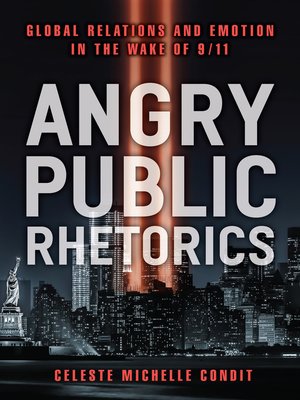Angry Public Rhetorics
ebook ∣ Global Relations and Emotion in the Wake of 9/11 · Configurations: Critical Studies of World Politics
By Celeste Michelle Condit

Sign up to save your library
With an OverDrive account, you can save your favorite libraries for at-a-glance information about availability. Find out more about OverDrive accounts.
Find this title in Libby, the library reading app by OverDrive.



Search for a digital library with this title
Title found at these libraries:
| Library Name | Distance |
|---|---|
| Loading... |
In Angry Public Rhetorics, Celeste Condit explores emotions as motivators and organizers of collective action—a theory that treats humans as "symbol-using animals" to understand the patterns of leadership in global affairs—to account for the way in which anger produced similar rhetorics in three ideologically diverse voices surrounding 9/11: Osama bin Laden, President George W. Bush, and Susan Sontag.
These voices show that anger is more effective for producing some collective actions, such as rallying supporters, reifying existing worldviews, motivating attack, enforcing shared norms, or threatening from positions of power; and less effective for others, like broadening thought, attracting new allies, adjudicating justice across cultural norms, or threatening from positions of weakness. Because social anger requires shared norms, collectivized anger cannot serve social justice. In order for anger to be a force for global justice, the world's peoples must develop shared norms to direct discussion of international relations. Angry Public Rhetorics provides guidance for such public forums.
These voices show that anger is more effective for producing some collective actions, such as rallying supporters, reifying existing worldviews, motivating attack, enforcing shared norms, or threatening from positions of power; and less effective for others, like broadening thought, attracting new allies, adjudicating justice across cultural norms, or threatening from positions of weakness. Because social anger requires shared norms, collectivized anger cannot serve social justice. In order for anger to be a force for global justice, the world's peoples must develop shared norms to direct discussion of international relations. Angry Public Rhetorics provides guidance for such public forums.







